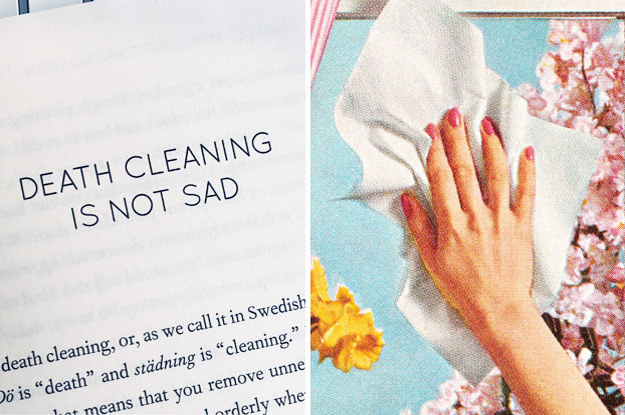Dö means death in Swedish and städning means cleaning. The thrust of the idea is to slowly begin decluttering your home so your death isn't such a burden for your children or those who will have to clean up things after you are gone. It sounds terrible but long before the rest of the world learned the Swedish name for it, they were already doing it. On the one hand, paring down was associated with death but on the other hand it was connected to retirement or downsizing. Once you reach the end of middle age (whatever that is currently, you start looking around your home and the various closets, basement, or atticstorage areas and you begin to wonder if you really need or want all the stuff that is hidden away or cluttering up the public areas of your dwelling. A while ago I read about this according to Margareta
Magnusson, whose book, "The Gentle Art of Swedish Death Cleaning: How to Make Your Loved Ones’ Lives Easier and Your On Life More Pleasant," was published in 2018.
All you have to do is watch some decorating and DIY shows on TV that feature Scandinavian design and you already know that the current model is more spare than others. I grew up in a Swedish community and cannot substantiate that it was like this long ago but there was always a sense of less is more at a certain age. When my grandparents moved off the farm and into town, they left much behind -- they did not want it or have room for it anymore. They did not quite retire (it was the early 1960s) but they did change their work and they changed the house to reflect this. Swedish Death Cleaning is in one sense a general decluttering process. It may be in tune with the need to envision your family and heirs have to
deal with the stuff you leave behind but there was also a sense of relief as the external work of decluttering bore some fruit in the peace and contentment of life as well.
While I would not press the analogy too much, it is the nature of repentance as well. It is death cleaning in the penultimate sense. Repentance begins with the affirmation that sin is not simply excess baggage but the mark of death's claim upon us. We repent because sin has cluttered up our lives and hearts and it has become unmanageable. We cannot bear the weight of it anymore. Repentance is made possible by the Lord Jesus who has come to rid our lives not simply of the clutter but the clutter that marks us with death. Like the hoarder on TV whose home is filled with mold and all sorts of other toxic things that have slowly stolen not simply their quality of life but the very life itself. Sin has not simply made our lives bad, it has stole our lives from us and repentance admits what sin has done. The lament of our hearts is not simply for the actual sins that cross our minds and our lips and are acted out in our bodies but for the condition that has cast its shadow over us and over all things. This comes with our own deep regret and contrition over the part of all this that we participated in. And this happens every Sunday when we confess the sins we have thought, said, and done and the uncleanness that we cannot wash away.
Death cleaning for us is the admission of that which causes death and of the cleaning that God has supplied to give hope to those who live in the shadow. More than simply removing the sin and its consequence, God has undertaken the larger task of teaching our hearts to love the things of God more than we love ourselves and the familiar paths of sin that have marked our lives since their conception. So a little death cleaning on a Sunday morning is a pretty good thing. . .

No comments:
Post a Comment